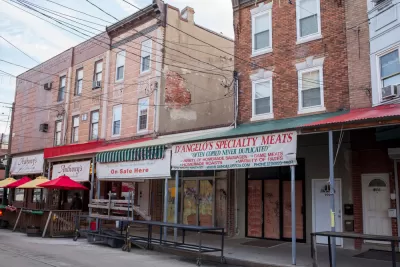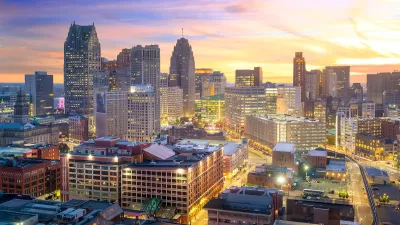A growing movement to create community-owned commercial spaces could shift power away from institutional landlords.

A community ownership model for commercial real estate could provide a way for neighborhoods to take control of local development and put resources back into the community rather than into the pockets of absentee landlords or investment corporations. Writing in Next City, Oscar Perry Abello describes the movement to put real estate ownership in community hands.
“In Alaska’s largest city, the Anchorage Community Land Trust acquired nine properties over the course of 2005-2011, using all private funding. The properties now house space for seven nonprofit organizations; a building that houses the CLT’s office and a training center and art studios for Alaska Native and American Indian artists; a restaurant; a credit union; and also the 28,000 square-foot Grow North Farm and farmer’s market.” In Philadelphia, “The Kensington Corridor Trust is one of several community-owned or community-led commercial real estate entities at various stages of formation and implementation across the country, and they’re starting to get more notice.”
“Ownership over commercial corridors is an important factor for the development of neighborhoods, but it hasn’t been the focus of as much policy as affordable housing or homeownership. Due to historic – and ongoing – barriers in access to credit or opportunities in commercial real estate, it’s common for commercial corridors in Black or Latino neighborhoods to remain in the hands of property owners who no longer live in those neighborhoods, if they ever did.”
According to a Brookings report, just 3 percent of Black households own commercial real estate, with an average value of $3,600 as compared to 8 percent and $34,000 for white households. Proponents of community ownership say it allows residents to determine how properties will be used and ensure that tenant businesses serve local needs.
FULL STORY: Community-Owned Commercial Real Estate Is Having A Moment

Maui's Vacation Rental Debate Turns Ugly
Verbal attacks, misinformation campaigns and fistfights plague a high-stakes debate to convert thousands of vacation rentals into long-term housing.

Planetizen Federal Action Tracker
A weekly monitor of how Trump’s orders and actions are impacting planners and planning in America.

San Francisco Suspends Traffic Calming Amidst Record Deaths
Citing “a challenging fiscal landscape,” the city will cease the program on the heels of 42 traffic deaths, including 24 pedestrians.

Adaptive Reuse Will Create Housing in a Suburban Texas Strip Mall
A developer is reimagining a strip mall property as a mixed-use complex with housing and retail.

Study: Anti-Homelessness Laws Don’t Work
Research shows that punitive measures that criminalized unhoused people don’t help reduce homelessness.

In U.S., Urban Gondolas Face Uphill Battle
Cities in Latin America and Europe have embraced aerial transitways — AKA gondolas — as sustainable, convenient urban transport, especially in tricky geographies. American cities have yet to catch up.
Urban Design for Planners 1: Software Tools
This six-course series explores essential urban design concepts using open source software and equips planners with the tools they need to participate fully in the urban design process.
Planning for Universal Design
Learn the tools for implementing Universal Design in planning regulations.
Heyer Gruel & Associates PA
JM Goldson LLC
Custer County Colorado
City of Camden Redevelopment Agency
City of Astoria
Transportation Research & Education Center (TREC) at Portland State University
Jefferson Parish Government
Camden Redevelopment Agency
City of Claremont





























